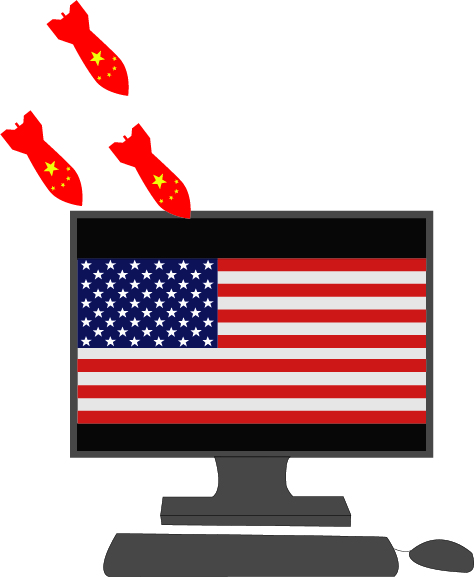Cyberwar: The Next Big Threat
The U.S. and China continue to race for the world’s economic and political spoils. Consequently, the two nations compete on issues ranging from foreign relations to public policy and often encounter conflict in their political and economic pursuits. As international tensions continue to build between the two nations, China has turned to a modern—and quite threatening— strategy to stifle competition: cyberwarfare.
In late January of this year, two leading U.S. newspapers, The New York Times and The Wall Street Journal, reported attacks on their computer systems, which cybersecurity experts subsequently traced back to Chinese hackers. A representative of the Chinese Foreign Ministry, however, denied all allegations, labeling them as “groundless, irresponsible accusations lacking solid proof or reliable research results.” Despite China’s official stance against any foreign or domestic hacker activities in the past, this recent incident adds to the increasing number of cyberattacks on Western governments, companies, and key activists.
In an interview with Bloomberg News, a U.S. intelligence official claimed that the Chinese have been “relentless” in their actions targeting “U.S. military platforms, U.S. intelligence and communications satellites, weapons targeting systems, and navigation computers.” Additional data provided by a security research base reported that cyberattacks make up approximately 15 percent of daily global internet traffic, and that one in three computer attacks imposed on the United States in 2012 is traceable back to China.
The Chinese military is increasing its investment in its cyberwarfare branch, and, consequently, Chinese hackers are employing progressively advanced means of penetrating digital systems. Although the hacking operations require intricate skill sets and most attempts are successfully averted, China’s superior manpower and increased dedication to cyberwarfare have attained fruitful results.
The immediate repercussions of cyberwarfare may be difficult to grasp, as there have not been any precedent cases where cyberattacks have led to physical military collision. But, there have been instances where state-sponsored cyberattacks have yielded tangible results. Congress’s 2011 annual report revealed that hackers, presumably Chinese, interfered with transmissions to two U.S. satellites on multiple occasions throughout 2009, serving as tangible proof of the potentially destructive application of cyberwarfare. In another instance, the United States and Israel deployed Stuxnet, a computer virus which targeted a uranium enrichment facility in Iran.
It is not hard to imagine hackers disabling entire military networks or severely impairing military capacities in the foreseeable future. We must recognize that cyberwarfare poses a real and substantive threat to U.S. national security. Picture a scenario where China, or another foreign force, acquires classified information and control over certain administrative or military systems. With the international community and central world leaders struggling to maintain a balance of power, China’s access to other countries’ administrative sectors and knowledge of classified information could easily fracture this stable and balanced system. The notion that a country as militarily, politically, and economically influential as China could potentially come into possession of these powers is truly alarming.
But the threat doesn’t lie just in the military and governmental sectors; a common objective of the Chinese hackers is securing information concerning the Chinese government. The hackers who infiltrated The New York Times’ computer network did so in order to identify sources behind an exposé involving illicit money attained by relatives of Chinese Prime Minister Wen Jiaobao. This measure, presumably orchestrated by a higher Chinese authority, demonstrates the potential threat cyberattacks pose to journalists and the confidentiality promised to their sources. With political and economic retaliation out of the question, and the evidence against China circumstantial, we need to make a move to better protect ourselves against attacks.
In the State of the Union Address, President Obama pledged to mandate cybersecurity legislation that would help foster communication between the government and industry regarding hacking cases. Passing a bill that stratifies cybersecurity may not be a sufficient response to the urgent threat we are facing. Further efforts to ensure the security of existing systems must take place, most effectively by increasing the current capacity of workers responsible for cyberwarfare capabilities, and by recruiting and training technological experts who would work towards developing new and enhanced systems of security. A strengthened security system and legislative backing are our best bets in deterring the critical threat posed by cyberwarfare.
